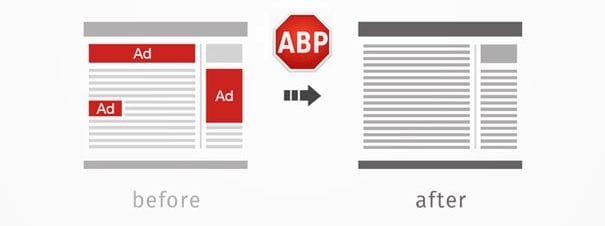We can all debate the merits of ad-blocking but there’s one thing that isn’t in question – ad blockers are here to stay. People are tired of all the annoying advertising that follows them around online. They don’t want to see banner ads flying around everywhere or have to wait for a video ad to end. The frustration has lead to a sharp increase in the usage of ad-blocking technology. While this is no doubt a shock to companies and individuals who make a living off advertising, it should not be a surprise. The Internet has turned into a giant billboard. Popular websites are starting to look more like Times Square.

What is an Ad-Blocker?
If you already know what ad-blocking is all about then by all means skip this section. Those new to the technology will want to stick with me as I’m about to walk you through what an ad-blocker is and how it works. In simple terms let’s first think of an ad-blocker in relation to billboards on the side of the road. If you’ve ever traveled close to a popular tourist destination then you know just how many billboards can be present as you drive down the road. In the case of this example an ad-blocker would eliminate the billboards. It would either remove them all together or cover them up. While that may not be possible in the physical world, that’s exactly what ad-blocking technology does for the Internet.


There are several ad-blocking software tools to choose from. Some of the most popular ad-blockers include Adblock Plus (ABP), AdBlock (no relation to ABP), and Disconnect. Some specifically block the advertisements and possible malware on websites while others include extra privacy features like VPN and private search.
Current State of Ad-Blocking Software
According to a recent report by PageFair and Adobe, the adoption of ad-blocking software grew by 41% between the second quarter of 2014 and the second quarter of 2015. The report gives a number of reasons why people choose to use ad-blocking software. The top reason is the misuse of personal information. Half of those surveyed said they would use an ad-blocker if they felt their personal data was being misused to target or personalize ads. Some 57% of millennials responded that they would start using an ad-blocker if the number of ads continues to increase. Only 25% of millennials said they had no interest in ad-blocking.
The report went on to share a number of interesting statistics:
- 41% growth in the usage of ad-blockers between 2014 and 2015.
- Ad-blocking usage in the UK grew by 82% to 12 million.
- Nearly 37% of Internet users in Greece block advertising.
- Over 77 million European users actively block ads each month.
- Over 45 million users in the U. S. actively block ads each month.
- Nearly 200 million users actively block ads worldwide each month.
Rapid Growth Ahead for Mobile Ad-Blocking
The growth trend is expected to increase even faster as Apple plans to introduce ad-blocking technology in the upcoming iOS 9 release. Prior to iOS 9 ad-blockers were mainly confined to desktop extensions for Chrome and Firefox. Only 16% of mobile Firefox users block ads. Apple will be bringing the technology into the spotlight for mobile users with the release of iOS 9 in the weeks to come. The new iOS update will allow users to install ad-blocking software to stop advertisements from showing up in their Safari web browser.
Why would mobile users want to block ads? You can start by looking at the same reasons PageFair found in their research paper and then add a few more. Mobile users are impacted more by advertising. For starters using an ad-blocker will help them load websites faster. It will also make some websites easier to view, especially on smaller phones. Apple iPhone and iPad users will soon have the ability to install ad-blocking software for Safari. According to a post in the Wall Street Journal the move “threatens to disrupt the $70 billion annual mobile-marketing business,” and could certainly have an impact on Google which makes more from online advertising than any other company.
The growing adoption of ad-blocking software is certainly drawing the attention of publishers and advertisers. Ad revenue is the main source of income for most websites but that doesn’t mean users will turn their heads and accept the growing number of ads and increased personal targeting. Companies like PageFair are working with publishers to come up with a better model. I agree with their approach of focusing on loyalty rather than traffic and clicks. One thing is for sure, if publishers continue to increase the number of ads presented and people feel their personal data is being misused to for ad targeting then users will respond by utilizing ad-blocking technology at home and on their mobile devices.
